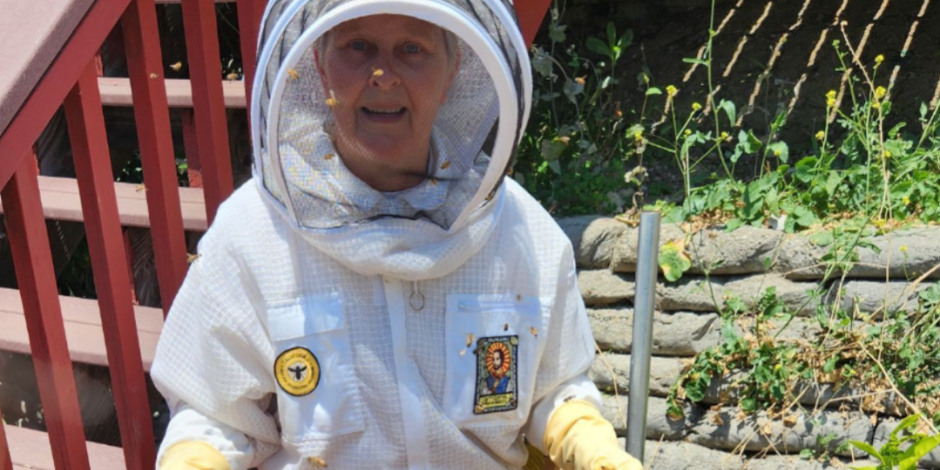Starten Sie den Audio-Text
Mit dem Audio-Player können Sie sich den Text anhören. Darunter finden Sie das Transkript.
Did you know that bees are important for humankind and the economy? Listen to this extract from the interview between Business Spotlight correspondent Talitha Linehan and Los Angeles-based urban beekeeperBienenzüchter(in), Imker(in)beekeeper Charlene Potter. We’ll test your understanding of their conversation afterwards. Ready? Let’s begin.
Talitha Linehan: Why are bees so important, and why do we need to save them?
Charlene Potter: OK. Erm, well, first of all, it’s about food. Every third bite of food you take is thanks to the bees. And that’s a lot of food — 33.3 per cent of our food. So, if we have a problem with our most ambitious and efficient pollinatorBestäuber(in)pollinators, which is the honeybee, then we’re going to have problems because cropNutz-, Kulturpflanzecrops are not pollinate sth.etw. bestäubenpollinated — you don’t get the food. So, the fruits and vegetables and nuts that we expect to eat are thanks to the bees. I’m really be big into sth. (ifml.)sich für etw. stark machenbig into food, and I see the bees as a big part of that. And then, in terms ofin Hinsicht aufin terms of saving the bees. You know, it’s an issueProblemissue, right? And there’s always two sides to every story. So, I think it’s important because I follow scientific beekeeping.
The science shows there’s an organization called the Bee Informed Partnership, and they do a study every year and ask — it’s a surveyUmfragesurvey — and they ask beekeepers, you know, “What happened with your hiveBienenstockhives this year? You know, how many did you lose? How did you lose them?” It’s a lengthyhier: umfangreichlengthy survey, and then they collect all this data, and they share it with, you know, the world. And last year, take a guessschätzen, ratentake a guess what percentage of hives were lost. And by lost, I mean died — dead.
Talitha: 50 percent?
Charlene: Yeah, 48.2 percent.
Talitha: I mean, I’ve read a lot of the stats and studies, so...
Charlene: Just, I mean, think if you were, I don’t know, a farmer with, with chickens or cows or goatZiegegoats or sheep or whatever, or even just a farmer with, you know, a grainGetreidegrain, like corn (US)Maiscorn or wheatWeizenwheat or something. Imagine that you lost half of your crop every year. It’s not sustainabletragbarsustainable. So, do we have to save the bees? Yeah, we do. We do. We definitely have to save the bees. Why are almost half of the bees dying? There’s a lot of answers, and you could place the blame in a lot of places, but I think those are questions that we need to ask ourselves, right? And I think it has to do with, of course, pesticides.
Pesticides work their way up the food chain. So, if it’s killing bees, I mean, these tiny little insects… You ignore them most of your life, unless you know a beekeeper, you just ignore them, you know? And you’re afraid of them, and you kill them and you, you know, you pesticide [non-standard usage] them, and you kill them with toxic chemicals, but that goes up the food chain. And it’s just like when you poison rats, you know, and or whatever you’re trying to kill. Even if it’s antAmeiseants or cockroachKakerlakecockroaches, it goes up the food chain and that becomes our food. I think it’s damningvernichtenddamning for us as well, in terms of, you know, just your immune systems, your health. And I think we need to save the bees because we need to save ourselves. I have a T-shirt — it’s a picture of a bee and it says, you know, “If I die, you’re coming with me.” So, we need to save the bees.
Now, let’s move on to an exercise to test your understanding of some of the words and phrases used in the interview. You’ll hear an incomplete sentence based on what you have just heard. Choose option a) or b) to complete the sentence correctly based on Charlene Potter’s answers. Ready? Let’s begin.
1. A “pollinator”...
a) is an animal or insect that moves pollen from one plant to another.
b) is a device made to extract pollen from plants.
→ a) is right. A “pollinator” is an animal or insect that moves pollen from one plant to another. “Pollen” is the yellow substance found at the center of flowers that is carried from one plant to another by animals and insects. Honeybees are the most efficient pollinators.
2. A “hive”…
a) is a place for bees to nestnistennest.
b) is the busy activity of a swarm of bees.
→ a) is right. A “hive” is a place for bees to nest. You might have also heard the expression “a hive of activity”. This expression is used to talk about very busy places, for example: “The conference center was a hive of activity.”
3. A “crop”...
a) is a field used for farming purposes.
b) is a plant that is grown at scalehier: in großem Umfangat scale and sold commercially.
→ b) is right. A “crop” is a plant that is grown at scale and sold commercially.
4. The “food chain”...
a) is a problem that occurs when an organism’s supplyLieferung, Versorgungsupply of food becomes become endangeredgefährdet werdenendangered.
b) is a group of living things, each of which is dependent on the next one as a source of food.
→ b) is right. The “food chain” is a group of living things, each of which is dependent on the next one as a source of food.
Neugierig auf mehr?
Dann nutzen Sie die Möglichkeit und stellen Sie sich Ihr optimales Abo ganz nach Ihren Wünschen zusammen.



